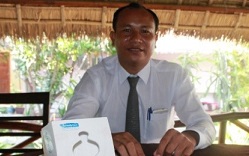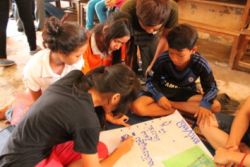UN Women features UN Trust Fund grantee CARE Cambodia
Date:
What? CARE works to make entertainment establishments such as beer gardens and karaoke bars safer for women through the Non-Violent Workplace Initiative. Once businesses have signed up to this, they are provided with posters and handy materials such as tissue boxes which include information about sexual harassment laws.
When? Ongoing
Where? Beer gardens, restaurants, karaoke bars in and around Phnom Penh
Implemented by? CARE, working with the Ministry of Women’s Affairs
Funded by? UN Trust Fund to End Violence Against Women

In Cambodia, women who work selling beer are often sexually harassed by their customers. Simple items with information about the laws on sexual harassment in Cambodia remind men drinking at bars and restaurants that they should treat women with respect.
Restaurant manager Doun says: “We always place tissue boxes on tables – including messages on these is an easy way of making sure that customers are aware that harassment of staff will not be tolerated....Before we used to have up to three cases of harassment almost every day; now we are clear to our customers this is not acceptable, we have had only three cases of physical harassment in the last year... Staff are happy to see the restaurant take steps to make customers reduce harassment. They now stay working here a long time as they feel safe and know they are supported.”
See also:
----------------------------------------------------------------------
What? Peer educators conduct awareness raising with fellow students about ending violence against women every orange day.
When? Every 25th of the month
Where? High schools and universities in Phnom Penh, Cambodia
Implemented by? CARE Cambodia with local partner People Health Development (PHD)
Funded by? UN Trust Fund to End Violence Against Women

Young men and women at high schools in Cambodia’s capital Phnom Penh share messages with fellow students every orange day. 15-year-old Sakseth, who has been a peer educator since April, says, “I share messages and information about ending violence against women to encourage boys at school to treat the girls with respect.”
See also:
--------------------------------------------------------------------
What? Regular peer education sessions run by students for student
When? Monthly
Where? High schools and universities in Phnom Penh, Cambodia
Implemented by? CARE Cambodia with local partner People Health Development (PHD)
Funded by? UN Trust Fund to End Violence Against Women
